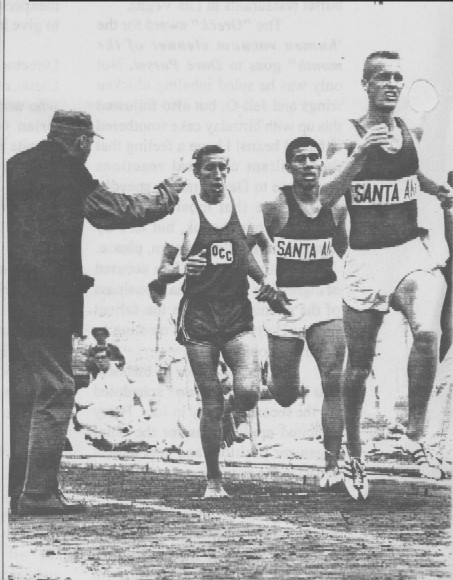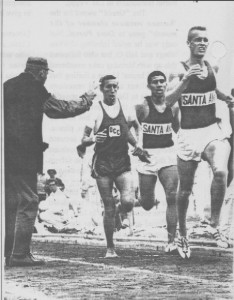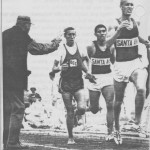Thanks for all the Memories
Orange County Track Club by Willie GuevaraAs many of you already know, original Orange County Track Club member Vince Sweetser will retire this year from the Post Office and relocate to HAWAII in December. Vince joined OCTC as a college freshman in 1962 (36 years ago) and has held every officer position possible. It is appropriate that OCTC bid goodbye to Vince and Dianne with a front-page Member of the Month Profile.
Story
Willie: When did you start running?
Vince: I started running in my freshman year in high school in 1958 at Costa Mesa HS. I just enjoyed running, joined the track team and continued through school. I went to college to pursue my running, not for an education but things worked out good. I started out with the 660 yards (lap and a half), the two mile, then cross-country, then went on to Orange Coast College after graduating from Newport Harbor in 1962. My coach Norm Lumen opened my visions towards running different distances. So I ran the mile and 2-mile in college. In 1962, I ran a 3-mile national track race in 14:40 and finished 5th in the country among all the college freshmen that year. I had a school record at my first attempt at it. I was quite amazed that the coaching and my ability seemed to keep expanding at that time. Everything was a challenge to me.
Willie: Who were your role models growing up?
Vince: I always envied Herb Elliott and Peter Snell. Herb was one of the best milers of his era. Peter was a half–miler and miler. They made running look effortless at the speeds they were accomplishing.
Willie: Tell us how OCTC started while you were at Orange Coast College.
Vince: We basically started out as Orange Coast College runners. Somebody came up with the idea of running as a group with other high school and college runners in between college seasons, so we decided on the Orange County Track Club as our identity. Other clubs at the time were Southern California Striders, Los Angeles Track Club and the Culver City Athletic Club. We didn’t have any formal workouts, no newsletters like that. We communicated on the phone and competed at summer track meets.
Back then, there was the AAU meets that cost 50 cents to enter. There were hardly any races in Southern California at all, maybe one per month. The big thing then was 10-mile races or handicapped races which were a lot of fun. You try to figure out a time at a certain distance you had run before and figure out a minute per mile pace. Then you have your slower runners start out first and the faster ones last, to see who could cross the finish line first. It was a lot of fun.
We started OCTC with 25-30 members. We went through various cycles with lots of members to down to nothing. I’ve held all the positions at one time or another. My duty was to make phone calls to get people to races wearing our uniforms. I ended up paying for our uniforms from my own pocket, and sold them to people as they joined. We had all abilities represented but we had mostly competitive runners then. We were represented at the AAU as a charter member. I remember members being outraged when the AAU raised the entrance fees for races from 50 cents to $1.00. There were no T-shirts then. Anybody who put on the race, all awards came from that persons pocketbook.
Willie: How many marathons have you done? What were your most memorable races?
Vince: I’ve run 20-30 marathons. My first one was San Diego in 1964. It was an extremely hot day, it got up to the 90’s. Our idea was to run as a group and hold every-body together as a team as long as they can. I ended up in 7th place with a 2:58 finish as most of the top runners started out too fast in the heat. There were about 200 runners then.
My best marathon was the1970 Palos Verdes Marathon. I ran with another OCTC runner. We started out real slow, not worried about pace, and we seemed to hit it off real good. It’s a mental game. After 17 miles, he dropped off, I just kept on going. I had to walk about a quarter mile until a high school kid passed me so I decided to get going again. I ended up in 3rd place overall in 2 hours and 37 minutes.
Willie: I understand you ran “barefoot. What was the reason for this?
Vince: I was raised in Newport Beach and went barefoot wherever I went. I developed big calluses on my feet so I just taped up my arches. Nothing would slow me down as far as rocks because my calluses were so thick. Just the idea of having shoes on my feet slowed me down. It was a mental thing with me. I’m certainly a beach boy.
I ran more on the toes and the ball of my feet. On running Ultras, my philosophy is not how much mileage you have, but how you do it. When I trained for marathons and the San Juan Trail 50, I would not train more than 15 miles, but I would push myself harder.
I only had 6 weeks training for the 50 miler, from a zero base. It was a unique experience. I did a lot of walking. A combination of lower back injury, some knee problems, but last couple of years, I’ve had ankle problems, achilles tendinitis, tendons on top of my foot slowed me down quite a bit. It was just one injury after another the past 7 years. Some tended to be blessing in disguise except my training went down the hill. Now my biggest motivation is taking that first step out of the house for a run. I run only 2-3 days per week. We run Sundays on the base of Saddleback Peak on off-road trails.
Willie: What are your immediate plans?
Vince: I’ll be retiring in December (at age 55) and relocating in December to Kaui Island in Hawaii. I ran an 8-mile race in Kaui 2 weeks ago. I had sciatic problems 4 days before the race and had to get a masseuse to work on me. Luckily, it rained the last third of the race, I was able to stay cool and finish. I was going to hold an OCTC meeting in Kaui in June but nobody showed up, I was disappointed. Maybe we’ll have a club race in 1999 in Hawail.
Willie: What direction would you like to see OCTC take during the next 5 years? What suggestions would you offer?
Vince: I would like to see more active recruitment in the high school, college, and junior college level runners. We can contact coaches during the school year or write letters to these coaches and offer them a chance to continue running as a group competitively. It would help these individuals out, and help the schools out when they get back in shape for their seasons. It would bring new and more competitive runners into the group and give us a shot in the arm so to speak. Most running clubs in Southern California are social runners, a little older. We need some young blood.
We can also have guest speakers at our club meetings, like Olympic qualifiers for the marathon who can share us tips about their experience.
Willie: What parting words or ad-vice would you give to our members at OCTC?
Vince: The only thing I can say. I’ve told other runners is don’t always look for tomorrow. Treat your running, such as a race, as your last one and go for it. Because you don’t know if the downhill swing is going to hit you. Or if an accident will end your running career. Never save yourself for the next day. You never know what tomorrow will bring.
Related Links
Gallery
- Vince Sweetser




I would like to know why he has all the injuries now, Is it because he spent all those years running barefoot?
Jeff
That’s not something that we could test and make precise conclusions about… We do know that Charlie Robbins ran barefoot for more than 60 years and was never injured – he died of cancer in his 80s.
My guess is that Vince didn’t know much of what we do know now… for example; that you don’t need arch support (he wrapped tape around his arches for support). I have often suspected that arch support, which doesn’t allow the foot to flex naturally, is one of the contributing causes of Plantar Facsiitis (which seems to respond well to flexibility exercises). But, none of these things have been proven “scientifically”, nor can they on a single individual. In a scientific study, we look at statistics, percentages of people affected by a certain factor, and compare with a group of people not exposed to that factor. Even then, the results are nearly never 100% of the people will be affected the same way by any given factor that is being studied.
I would respond to the implication that any single barefoot runner was injured due to a life of barefoot running, with the observation that I know of many runners, and many more former runners who suffer or suffered chronic and sometimes “permanent” injuries and only ran in shoes. More importantly, I know of many barefoot runners who had suffered chronic (and some so-called “permanent”) injuries and pains (some after only a few years) from running in shoes, and are now able to run comfortably because they ditched the shoes and began running barefoot.
If you’re looking for a foolproof way to never be injured, there isn’t one. Only a fool would believe there is. Welcome to the reality of life.
Thanks for the reply. It is true that the few times that I have ran barefoot, My foot feels a little bit stronger. I just need to keep doing this consistently.